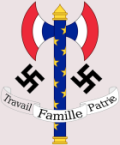 |
|||||||||||||||||||||
|
New Book |
|||||||||||||||||||||
|
|
|||||||||||||||||||||
|
|
|||||||||||||||||||||
 |
Hunting down the JewsVichy, Nazis and Mafia Collaborators in Provence 1942-1944 By Isaac Levendel and Bernard Weisz Introduction by Serge Klarsfeld ISBN 978-1-936274-31-4 e-ISBN 978-1-936274-32-1
Research for this project spans the period from 2005 to 2010 and is rooted in a personal tragedy: Sarah Lewendel, a Jewish woman originally from Poland was arrested and disappeared in the vortex of the Nazi extermination machine on June 6, 1944, D-Day. She left a small boy behind who has lived with this wrenching tragedy since that fateful day over 65 years ago. In an effort to discover the truth of what happened to his mother, the author has carefully reconstructed the entire history and mechanism of the Holocaust in Provence, the region around Marseille, in the department of Vaucluse and its main city, Avignon. During the first phase of the Vichy regime from June 1940 to November 1942, before the German occupation of the free zone, the progression toward the policy of extermination follows the various decrees and decisions issued by the a number of administrators and local chiefs as they enacted the edicts of Pierre Laval and the commissioners for Jewish Affairs. The persecution of the Jews in the free zone culminated with the deportation of foreign Jews in August 1942. When Germany invaded southern France in November 1942, a significant change took place. First, the Vichy government, by and large, began dragging its feet. Second, the Germans were facing two problems. On one hand, they were unfamiliar with the area and its language, and the attention of the German police was diverted to the war effort, leaving few resources for the hunt of the Jews. To fill the gap, the German police made abundant use of free-lance Jew hunters, who seized the opportunity. The Vaucluse becomes a microcosm of the rest of France along two lines. First, the facts demonstrate how the total extermination of the Jews that Berlin was seeking were modified and often softened along the way. Additionally, the Vaucluse serves as a model to understand how local conditions impacted the fate of the Jews in other French areas, in both the Southern or ‘free’ and the Northern zones. The details of Nazi and Vichy anti-Semitic policy and the mechanisms of collaboration with its Mafia component have never been deconstructed with such accuracy and effectiveness. Many assumptions will have to be revised after the publication of this book that is destined to become a major reference work for historians and the reading public. About the authorsIsaac LevendelBorn in Avignon in 1936, Isaac Levendel has accumulated rich experiences over the years. An engineering executive turned historian, he has published an investigative historical memoir, Not the Germans Alone (Northwestern University Press, 1999 and 2000), with a preface by Robert O. Paxton for which he has received two awards. He is also the author of more than 50 technical articles. Levendel worked at many manual jobs, taught and educated a group of socially handicapped children in the early sixties, organized Jewish emigration out of Morocco (1965-1967), held many positions in the telecommunications and computer industries, taught undergraduate and graduate classes, and served on numerous boards and committees. He is a consultant in software development methodologies and in wireless communication. He is also engaged in a project about World War II history. He holds a BS from the Technion – Israel (1971), a MS from the Weitzmann Institute of Science (1973) and a PHD from the University of Southern California (1976). He lives in Chicago, Ill. Bernard WeiszBernard Weisz was born in 1946 in Marseille. In Paris from 1971 to 1990, he was a teacher and a journalist, involved in cultural affairs. Back in Provence, from 1991 to 2004 he worked with troubled youth, reported on the lives of senior citizens and conducted investigations about minority groups (Jews, Gypsies, the ‘pieds noirs’ or French nationals forced to leave Algeria). He took part in several documentaries about peasants of Vaucluse. Weisz published two books: Avignon, Festival of Memory, the only book about the first few years of the Avignon Theatre Festival founded by Jean Vilar in 1947. He also published 5761 in Avignon, about the Jewish presence in the city. Bernard Weisz comes from a Jewish family with deep roots in the area of Avignon (“The Jews of the Pope”), and has deep personal connections to the Holocaust because of the many victims in his family. He holds a Masters degree from the University of Aix-en-Provence. He lives in Avignon. Serge KlarsfeldSerge Klarsfeld, is one of the foremost historians on the fate of the Jews in France during the Second World War. A lawyer and the author of a dozen books about French Jewry during World War II he has been active in bringing Nazi and Vichy officials to trial. He is president of the organization: Sons and Daughters of the Jewish Deportees of France. Born in Bucharest in 1935, Klarsfeld miraculously escaped arrest by the Gestapo in Nice in 1943. His father was killed at Auschwitz. He holds a doctorate in history from the Sorbonne and is an attorney at the Court of Appeals in Paris. Klarsfeld has successfully brought many Nazi criminals to justice, namely: Kurt Lischka, Klaus Barbie, and Alois Brunner. He led and initiated the cases against René Bousquet, Jean Leguay, Maurice Papon, and Paul Touvier. He revealed the crimes of Vichy to the French public and is considered instrumental to President Jacques Chirac's 1995 declaration officially recognizing France’s responsibility during World War II. He is vice-president of the Fondation pour la Mémoire de la Shoah. He lives and works in Paris. |
|
|
|
Francais |
||||||||
|
|
||||||||

